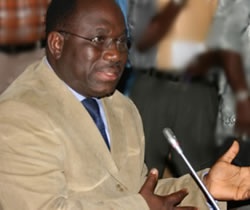The Court of Appeal has dismissed the notice of appeal filed by a former Minister of Transport, Dr Richard Anane in respect of the refusal of the Fast Track High Court to refer a criminal case he is involved in to the Supreme Court for interpretation.
According to a three-member panel presided over by Mr Justice Jones Duose, the appeal was filed outside the time allowed for interlocutory appeal and that had therefore, rendered the appeal incompetent.
Other members of the court were Mr Justice Paul K. Gyaesayor and Mr Justice Saeed K. Gyan.
The court also directed a second appellant, Dr Anthony Osei Akoto, to apply for leave to file his written submission by April 2, 2013 or risk the case being struck out.
Dr Akoto Osei and Dr Anane, together with three others, have been accused of causing financial loss to the state regarding the sale of Ghana Airways and the operations of the defunct Ghana International Airlines (GIA).
Others charged alongside the two are Kwadwo Mpiani, a former Chief of Staff and Minister for Presidential Affairs; Sammy Crabbe, a former Greater Accra Regional Chairman of the New Patriotic Party (NPP), and Prof. George Gyan-Baffour, a former deputy minister at the Ministry of Finance and Economic Planning.
The accused persons had requested for relevant documents to aid their defence, under Article 19 (2e) of the 1992 Constitution, which states that “a person charged with criminal offence shall be given adequate time and facilities for the preparation of his defence”.
But the state opposed the application on the grounds that sections 163 and 181 of the Criminal Procedure Code of 1960 (Act 30) do not allow accused persons who are standing trial summarily to have access to such documents before they are tendered in evidence as exhibits.
Giving its ruling on July 16, 2010, the Fast Track High Court upheld the state’s submissions and, consequently ordered the accused persons to present themselves for trial.
The court had held that the issue raised by the appellants did not border on the Constitution and, therefore, refused to refer the matter to the Supreme Court.
Following the court's ruling, lawyers for Dr Anane and Dr Osei decided to file an appeal against the court's decision.
But it was not until October 7, 2010 that Dr Anane filed his notice appeal; being 84 days instead of the mandatory 30 days or the 21 days allowed for interlocutory injunctions.
As a result of that the state filed a motion praying the court to strike out Dr Anane’s notice of appeal on grounds that he had filed it out of time.
In response to the state’s request for his case to be struck out, Dr Anane in his written submissions had made a case for his inability to file his appeal within the stipulated period because of the legal vacation which was from August 1, 2010 to September 30, 2010.
Reading the court’s ruling, Mr Justice Gyan said attempt by Dr Anane to introduce the issue of legal vacation into the argument was a “red herring and appeared to be a desperate act” adding that his argument had rendered the notice of appeal incompetent.
It said condition precedent for filing appeal cannot be varied by any court.
Representatives of the Attorney General, Mr Matthew Amponsah and Kwame Amoako could not resist nodding their heads in unison while the court read its decision.
The two appelants—Dr Anane and Dr Akoto sat in court soberly and conferred with each other occasionally.
The Court acknowledged Dr Akoto's notice of appeal and submitted that he filed it within the stipulated period but had issues with the submission of his written submissions.
The court, therefore, directed Dr Akoto to apply for leave by April 2, 2013 to re-file his written submission or risk the case being struck out.
According to the court, it had given many concessions and deadlines to Dr Anane but each has been breached.
“We should not create the impression that there are different standards for different people,” the court held.
In an apparent gesture to Dr Osei, Mr Justice Duose said “we are now confining you to a specific time. If you fail, we'll strike it out. Your case is an interesting one but you are not approaching it as expected.”
According to Justice Duose, human right was a serious issue hence the person seeking it and the one dispensing it must work with speed.
“We expect that lawyers fighting for human rights will do so with speed,” he added.
General News of Tuesday, 2 April 2013
Source: GNA
Court dismisses Anane's notice of appeal

Entertainment















